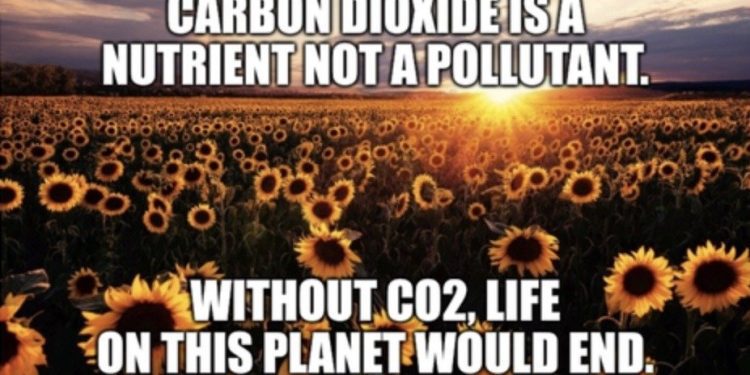CLAIM: A verified Twitter account user, bearing “A Man of Memes” on Jan. 2, posted a claim on the microblogging platform that Carbon Dioxide is a nutrient, not a pollutant.
He went further to note that without CO2 (Carbon Dioxide), life on this planet would end.
“CARBON DIOXIDE IS A NUTRIENT NOT A POLLUTANT. WITHOUT CO2, LIFE ON THIS PLANET WOULD END,” claimed A Man of Memes in his tweet.
CO2 is a Primary Building Block of Life. The Left wants you to believe CO2 is a Pollutant
Climate Change is about Control… Nothing More pic.twitter.com/6jhPoaRC3n
— A Man Of Memes (@RickyDoggin) January 2, 2023
The post, engraved on a designed background, was accompanied by a further claim that CO2 is a primary building block of life and that the left (advanced countries) only wanted people to believe CO2 is a pollutant.
Climate Change, he said, was about control and nothing more.
“CO2 is a Primary Building Block of Life. The Left wants you to believe CO2 is a Pollutant. Climate Change is about Control… Nothing More”, said the tweep.
The post as of Jan. 12, 2023 had been viewed by close to 4000 users, retweeted 155 times and liked by 277 tweeps with several comments.
VERIFICATION: UCAR Centre for Science Education describes carbon dioxide as a colorless and non-flammable gas at normal temperature and pressure.
Although much less abundant than nitrogen and oxygen in Earth’s atmosphere, the research-focused centre said carbon dioxide is an important constituent of the planet’s air.
A molecule of carbon dioxide (CO2), it said, is made up of one carbon atom and two oxygen atoms.
NASA, a United States-based global leader in space exploration, said carbon dioxide (CO2) is an important heat-trapping gas, or greenhouse gas, that comes from the extraction and burning of fossil fuels such as coal, oil, and natural gas, from wildfires, and from natural processes like volcanic eruptions.
Without carbon dioxide, Science Direct said Earth’s planet would be inhospitably cold, but an increase in CO2 concentrations in the atmosphere is, however, causing average global temperatures to rise, disrupting other aspects of Earth’s climate.
It is the fourth most abundant component of dry air, according to the UCAR Centre for Science Education; and today, it has a concentration of over 400 ppm (parts per million) in the atmosphere, as against 270 ppm before industrial activity.
Rice (1993) cited by Science Direct corroborated further that carbon dioxide is the major nonhydrocarbon gas found in coal beds, and can range from 0% to 99% of the total gas in coal beds.
Carbon Dioxide, a Nutrient or a Pollutant?
Carbon dioxide according to the JBL, a research website, is the nutritional basis for aquatic plants which is supplemented through micro and macronutrients and light.
The balance between all these elements, JBL explained, is necessary for thriving plant growth in the aquarium.
However, with about 40% rise in the carbon dioxide levels in the atmosphere since the start of the Industrial Revolution, it is raising global temperature, said the US-based NASA.
Lewis Ziska in his study titled “Rising Carbon Dioxide and Global Nutrition: Evidence and Action Needed“, reported that though carbon dioxide is widely recognised for its role in stimulating photosynthesis and growth for multiple plant species, including crops, the effect is, however, also likely to alter plant chemistry in ways that will denigrate plant nutrition.
Ziska cautioned that carbon dioxide should not be seen as uniformly beneficial since it serves as a nutrient to plants. Rather, he said benefits for plants, do not outweigh the physical disruptions associated with anthropogenic climate change.
“That role is also of tremendous importance, not only from a human health viewpoint but also from a global food–web perspective,” he said.
CONCLUSION: A claim that carbon dioxide is a nutrient, not a pollutant is MISLEADING. Studies have shown that the rising level of carbon dioxide poses a serious threat to human lives and is likely to alter plant chemistry in ways that will denigrate plant nutrition.
This fact-check was produced by BONews Service with support from Code for Africa’s PesaCheck, International Fact-Checking Network, and African Fact-Checking Alliance network.

